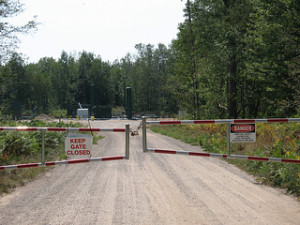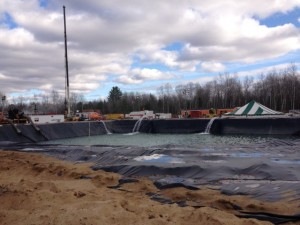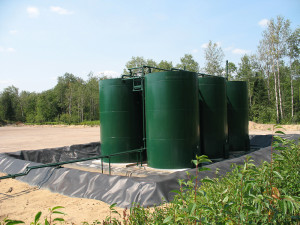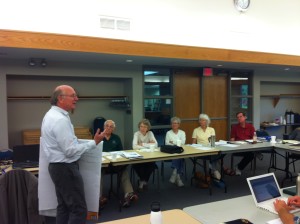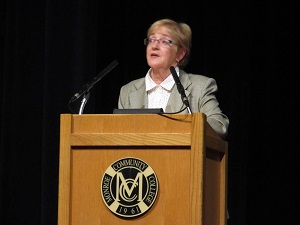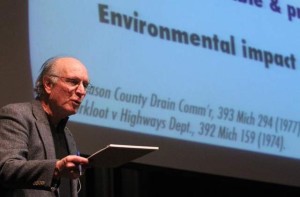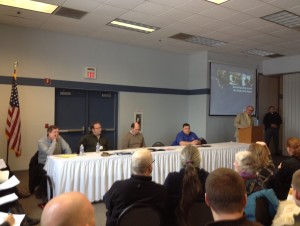
Jim Olson, FLOW President
This week I teamed up with Ralph Pentland, a leading Canadian water policy expert (see Pentland and Wood, Down the Drain, Greystone Books, 2013), and submitted to the Ontario Parliament comments on Bill 6, its proposed Great Lakes Protection Act. Bill 6 looks to the future by requiring policy and initiatives to protect Lake Ontario and Lake Erie, but does not declare or recognize the importance of protecting the public’s right to use these waters and the water they depend on for enjoyment.
FLOW has been working at several levels to make sure the Great Lakes are protected as a public trust – with the International Joint Commission, federal government, and the states. But Canada and its provinces are equally part of the Great Lakes Basin and community, and they, too, recognize the importance of the public right to boat, fish, and swim in the Great Lakes basin. As you may know, the U.S. Supreme Court and state courts have ruled for more than 100 years that the waters, shore, and bottomland of the Great Lakes and all connecting or tributary streams and waters are owned by the state and held in trust for all citizens of each state, as legal beneficiaries. This means the state must protect, and that others cannot impair, the public’s right to boat, fish, swim and enjoy these public trust waters and shores.
Canada’s Pentland and my joint comments on Bill 6 to Ontario legislators and leaders spell out the application of the public right to use these waters that is recognized by the provinces, and that these rights, like the public trust in the U.S., are held in trust by the government. On both sides of the border, these waters are held in trust, and government has an affirmative duty to account to the people as beneficiaries that the waters have been and will be protected. If governments or others violate this duty, citizens have a right to demand the violation is correct — like beach closings, nutrient run off and “dead zones,” and drops in water levels. Pentland and I urge Ontario to declare these waters a public trust and impose duties and rights to make sure the rights of all citizens, the legal beneficiaries of the trust, are honored from one generation to the next.
The full text of our comments are set forth below:
Click here to view the comments as a PDF
31 October, 2013
Submission Regarding Bill 6, Great Lakes Protection Act
Ralph Pentland1 and James Olson2
The preamble to Bill 6 states that “In the face of the pressures of population growth and development, and threats such as climate change and invasive species, three of Ontario’s four Great Lakes are in decline.”3
That is clearly an understatement. New toxic substances are showing up in fish and sediments. These include fire retardants, plasticizers, pharmaceuticals, and personal care products. Many of these pose a risk to fish, wildlife and people. Although the exact cause has not been definitively established, various species of Great Lakes fish now suffer from tumors and lesions, and their reproductive capacities are decreasing. Of the ten most valuable species in Lake Ontario, seven have almost totally vanished.
Non-native species are threatening the balance in biological systems and water chemistry, and climate change is contributing new challenges to the sustainability and health of the basin. In recent years, we have been witnessing biological deserts developing in some areas, a series of botulism outbreaks in fish and birds, and extensive algae blooms. An increasing proportion of these algae blooms are blue-green cyanobacteria, which when they break down release a variety of liver, skin and neurological toxins.4
We applaud Ontario for its environmental leadership for more than a century. It introduced the first nineteenth century public health Act, and was the first to manage water resources within the natural contours of river basins in the 1940s. Uniquely among provinces, Ontario enacted an Environmental Bill of Rights in 1993 which acknowledges that Ontarians “have a right to a healthy environment” and to “the means that it is ensured.”
In 2002, the Province passed the Safe Drinking Water Act, which tightened oversight of municipal utilities, and mandated water testing and reporting to provincial authorities. The Clean Water Act followed four years later. Both of these, along with existing legislation, such as the Ontario Water Resources Act (which among other things regulates municipal sewage discharge) received further updates in a suite of related amendments in 2009. And in 2010, the Water Opportunities and Water Conservation Act authorized a variety of measures, including mandatory plans for water sustainability.
The vision of Bill 6 to authorize policy initiatives, and if ever adopted implement the initiatives as benchmarks for governmental decision-making is laudatory. But, given the magnitude of the issues and the urgency for action to address the systematic threats to these waters, simply piling on more and more laws will not in and of itself accomplish the desired outcome. During the 20 years of legislative activism since enactment of the Environmental Bill of Rights in 1993, the Ontario Ministry of Environment lost 45 % of its budget, while overall government spending soared by 72% (in constant dollars). Coincidentally federal environmental capacity was also drastically curtailed over the same period. And not coincidentally, the decline in the health of the Great Lakes has accelerated over that same 20 year period.
After delivering his annual report to the Ontario legislature in November of 2011, Environment Commissioner Gordon Miller reminded reporters that “I have 30 years of experience and I’m nervous”. He pointed to a “culture of inaction and procrastination” in defence of water productive ecosystems, marked by a demonstrable decline in resources dedicated to protecting Ontario’s overtaxed landscape.5
Have we been making the right choices? Probably not. There is a growing body of evidence to suggest that well-designed and stringently enforced environmental regulation will yield economic benefits greater than their costs. As we let the quality, and in some instances the quantity of the Great Lakes and other provincial ecosystems decline, there is a very high probability that we are becoming both less wealthy and less healthy than we would have been if we had protected those ecosystems more rigorously.6
The proposed Great Lakes Protection Act has many good features. But, it could be both more effective and more beneficial if it were to include provisions designed to uphold the Bill of Rights guarantees of a “right to a healthy environment” and “the means that it is ensured.”
In enacting the Environmental Bill of Rights in 1993, the Province of Ontario essentially and quite appropriately accepted the fact that it has a fiduciary duty to preserve the essence of provincial environmental resources for the use and enjoyment of the entire populace into perpetuity. There can be no more important governmental responsibility than preserving the natural security supporting health, wealth and life itself.
The Ontario Bill of Rights commitments are not unlike the public trust doctrine as it has evolved in the United States and has been increasingly recognized in Canada. Public trust principles can be traced from Rome to the present, through both civil law systems, like those in France and Spain, and common law systems, like those in Canada and the United States. As a result, generally the waters of the Great Lakes are held in the public domain in the name of the Crown in Canada, and in the sovereign state in the United States, in trust for the benefit and welfare of its citizens.
Today, the courts in all eight Great Lakes states have recognized the public trust doctrine, either expressly by naming the Great Lakes and the connecting or tributary waters subject to a public trust, or though application of the public’s paramount right and use of public or navigable waters. More recently, the Canadian courts have begun to recognize the potential of public trust principles, and several Canadian water law and policy experts have urged the adoption of public trust principles by the courts or the provincial governments. And, while not labelled public trust, Canadian courts have consistently recognized that the Great Lakes are subject to a paramount right of the public to navigate, fish, boat and otherwise enjoy these waters. This means the governments hold the waters in trust to prevent a subordination or interference with this fundamental public right.
Under these principles, governments have a continuing duty to determine that there will be no significant impairment or harm to the flows, levels, quality and integrity of public trust waters, uses and ecosystems before they approve or deny a governmental private action. This duty requires the collection of data and information necessary for long-term planning sufficient to satisfy the solemn and perpetual trust responsibility, and affected interests and citizens as beneficiaries can institute administrative or judicial actions, as a last resort, to enforce public trust duties or apply public trust limitations that protect the integrity of the whole.7 If this duty is honoured by government and citizens, there will be instant consideration of the whole of the systemic threats facing the Great Lakes in every government decision that may impact these waters, their uses, and ecosystem. This would bring about instant accountability while the policy and initiatives called or by Bill 6 are developed and implemented.
Public trust (or public rights) principles could be introduced into Bill 6 by including:
- A general recognition of the interconnected or single hydrological relationship of the waters of the Ontario portion of the Great Lakes Basin with other portions of the Basin waters, including tributary groundwater and surface waters.
- A general recognition that these waters are held by the Crown in common and in public trust as recognized by decisions of the courts in Ontario and the Supreme Court of Canada.
- A recognition that, along with First Nation interests, each citizen has a right as a member of the public to use and enjoy the waters and the bed of the Great Lakes and connecting and tributary navigable waters for boating, swimming, navigation and other water dependent public needs.
- A provision that such public right to use and enjoy these waters shall not be subordinated to primary private purposes or otherwise materially interfered with or impaired.
- A provision that any initiatives, decisions and instruments made or proposed under this Act shall conform to these public rights in navigable waters.
Endnotes
1. Ralph Pentland is Acting Chair of the Canadian Water Issues Council at the University of Toronto. He resides in Ottawa, Ontario
2. James Olson is Chairman of FLOW U.S. (for the Love of Water). He resides in Traverse City, Michigan
3. Bill 6, Great Lakes Protection Act 2013
4. Ralph Pentland and Chris Wood, Down the Drain: How We Are Failing to Protect Our Water Resources, Greystone Books, 2013
5. Gord Miller, Engaging Solutions: Annual Report 2010/2011, November 2011
6. Chapters 7 and 8 of Down the Drain (see 4 above)
7. James Olson and Elizabeth Kirkwood, Submission to the International Joint Commission, Comments on the Lake Erie Ecosystem Integrity (LEEP) Report, Scientific Findings and Policy Recommendations to Reduce Nutrient Loadings and Harmful Algal Blooms
 FLOW is fortunate to host the party at a brand new venue, The Workshop Brewing Company, located at 221 Garland Street in the Warehouse District. The Workshop’s mission is to sustain nature, build community, and honor the craft of brewing beer. They do this by creating honest, traditional beers and wholesome, delicious food using ingredients sourced as locally/organically as possible, served with genuine warmth and enthusiasm, in a setting that is welcoming and fun.
FLOW is fortunate to host the party at a brand new venue, The Workshop Brewing Company, located at 221 Garland Street in the Warehouse District. The Workshop’s mission is to sustain nature, build community, and honor the craft of brewing beer. They do this by creating honest, traditional beers and wholesome, delicious food using ingredients sourced as locally/organically as possible, served with genuine warmth and enthusiasm, in a setting that is welcoming and fun.

